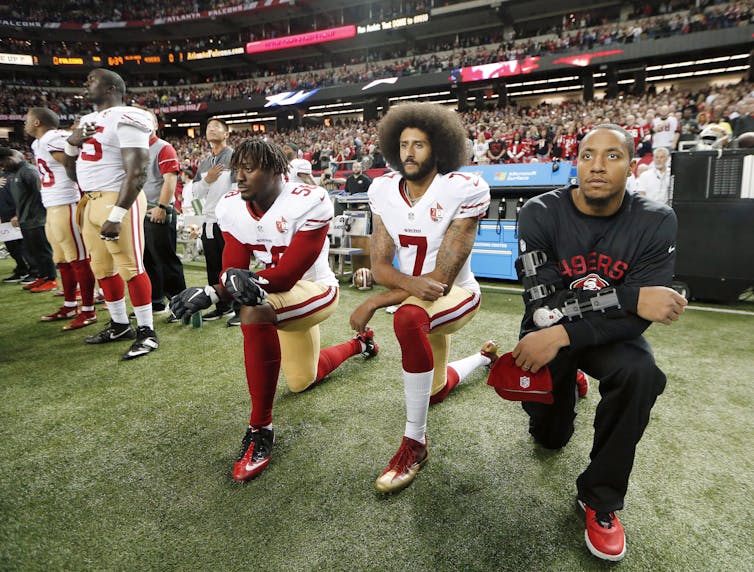Given that 77 per cent of people in Canada and 57 per cent of people in the United Kingdom watch a sports team regularly — compared to the 60 per cent of people who turn out to vote in Canada and the U.K. — it’s clear sports has an important and persistent influence on people’s lives.
Sports can serve as a beacon to provide societal leadership or reflect changes in wider society in significant ways. A historic example would be how the integration of sports leagues in North America paralleled the Civil Rights Movement.
But how can sports influence politics today?
Similar to supporting a political party, sports fandom aids in the formation of social identity. This happens when people look to form attachments with other individuals who they believe are similar to them in some way to cultivate positive self-esteem.
Men’s professional sports teams have historically engaged with certain political causes, namely the military and law enforcement, while neglecting others, such as the plight of marginalized members of local communities. Sports engagement with the military has been shown to boost military enrolment and support for government spending on the military in peace times.
Women’s professional sport, meanwhile, has drawn positive attention through its engagement with marginalized community members. The Women’s National Basketball League, for example, has engaged with the LGBTQ+ community to create safe fan spaces for the league.
Men’s sports protests
My preliminary research into these issues has shown that in men’s professional sports, there has often been hostility towards the introduction of newer, more inclusive causes into sporting events. In the National Hockey League, for example, some players refused to participate in Pride Night events on religious grounds.
Former professional quarterback Colin Kaepernick’s non-violent protest of police brutality in the United States resulted in his exile from the National Football League for the apparent “distraction” it created. A crucial element of the backlash against Kaepernick was allegations by conservatives that he disrespected the military and the American flag.

The power of this backlash was surprising given that in the U.S., Democrats and Republicans are equally likely to be avid sports fans, with no meaningful differences in the strength of their fandom. However, Republican sports fans tend to be more vocal about what causes should receive representation in sports.
Essentially, that means those who say athletes should “stick to sports” or “shut up and dribble” aren’t suggesting they don’t want any politics in sports. What they’re really saying is that they don’t want to see political views they oppose being represented in professional sports.
The patriotic causes that have routinely been championed by sports leagues and used for nation-building, such as the military, are viewed as apolitical and therefore appropriate in sports settings. Conversely, messages that are critical of a country or focus on historic inequalities have been deemed “inappropriate” and are excluded by sports because of potential fan backlash.
Can sports influence politics?
More recently, however, sports leagues and teams have begun to engage with social justice causes, such as LGBTQ+ rights in the U.K., Canada and the U.S..
These causes also include Indigenous rights and anti-racism messaging.
As sports organizations adapt to changing social norms and embrace newer social causes, they hold tremendous potential to impact political attitudes. They can showcase the acceptance of marginalized groups in previously hostile spaces, and provide valuable representation.
Furthermore, sports fandom identity has been shown to hold a strong psychological connection that can create feelings of inclusion which, in turn, can boost self-esteem.
This is why athletes make easy role models for children, and why watching sports events is a valued leisure activity for many people of all ages. Finally, sports fandom can also teach people how to cope with negative emotions or feelings of disappointment over time through emotional regulation.
How sports could influence attitudes
The representative and psychological value of sports fandom suggests sport is an understudied area of political science, one I hope to build on in my future research.
For example, we do not yet fully understand the impact that sports teams holding Pride Nights has on attitudes towards the LGBTQ+ community.
Nor do we know how soccer clubs in England, as local symbols of a migrant workforce, may impact immigrant attitudes.
Finally, we do not know why certain women’s national soccer teams, like Canada, have been successful in protesting for equal pay while others, like the Spanish team, have failed.
Sport could have a valuable role to play in unpacking these political questions about protest and identity — and represents an exciting emerging research area in political behaviour.
Noah Eliot Vanderhoeven does not work for, consult, own shares in or receive funding from any company or organisation that would benefit from this article, and has disclosed no relevant affiliations beyond their academic appointment.
This article was originally published on The Conversation. Read the original article.







